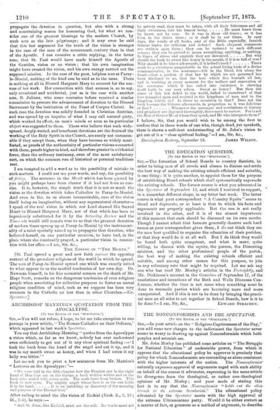ARCHBISHOP MA N N I NG'S QUOTATION FROM THE APOCALYPSE.
[TO THE EDITOR OF THE "SPECTATOR.")
Sin,—You will not refuse, I hope, to let me take exception to one passage in your article, " The Roman Catholics on their Defence," which appeared in last week's Spectator.
You say that Archbishop Manning " quotes from the Apocalypse a vision which, as far as we know, nobody has ever understood even sufficiently to get out of it any clear spiritual feeling:—` took the book from the hand of the angel and eat it up, and it was in my mouth sweet as honey, and when I had eaten it my belly was bitter.'" Let me ask you to print a few sentences from Mr. Maurice's " Lectures on the Apocalypse :"—
" Wo were told in the fifth chapter how the Prophet saw iu the right hand of Him that sat on the throne, a book written within and on the back side, sealed with seven seals. The seals have been broken. This book is now open. The mighty angel whose face is as the sun holds
it in his hand It is an unfolding or discovery of the meaning and purpose of the Eternal God."
After calling to mind the like vision of Ezekiel (Ezek. ii., 9, 10 ; iii., 1-4), he says :—
" And St. John, like Ezekiel, must eat the roll. Its words must not be merely read, they must be taken, with all their bitterness and all
their sweetness, into his inmost being He must know them by heart, not by rote. So it was in those old times ; so it has been in the times since ; so it shall be in our times. In easy- days, the words of all books, and of the Bible especially, furnish famous topics for criticism and debate! Such eloquent comments- are written upon them ; they can be tortured to such different senses; they can be proved to mean everything, anything, or nothing.. In times of stress and anguish they are devoured But why should the book be sweet like honey in the mouth, if it is so full of woe ? •
Why should it be bitter afterwards, if it is God's book ? There must be a sweetness unspeakable in the actual living taste of a divine communication, in the assurance—felt in the blood, felt along the heart—that a portion of that law by which we are governed has bean disclosed to us, that the love which lies beneath all law, and is working at every moment for the welfare and renovation of the creatures which it has called into existence, is showina, itself forth in our very selves. Sweet as honey ! But then the sense of this law defied in the world, defied in ourselves? of that love trampled upon and resisted in the kingdoms of mon and in the kingdom within us ? Is there no revulsion in that? Does not the book become the bitterer afterwards, in proportion as it was delicious
at first ? Whenever the messages and revelations of history and prophecy are digested thoroughly, there must be sorrow. For is not the Man of Sorrow Ho of whom they speak, and He who interprets them ?"'
I believe, Sir, that you would wish to be among the first to confess that in these words of one who, though dead, yet speaketh, there is shown a sufficient understanding of St. John's vision to- get out of it a "clear spiritual feeling."—I am, Sir, &c., Bari2ingham Rectory, September 16. JAMES WILSON._


































 Previous page
Previous page